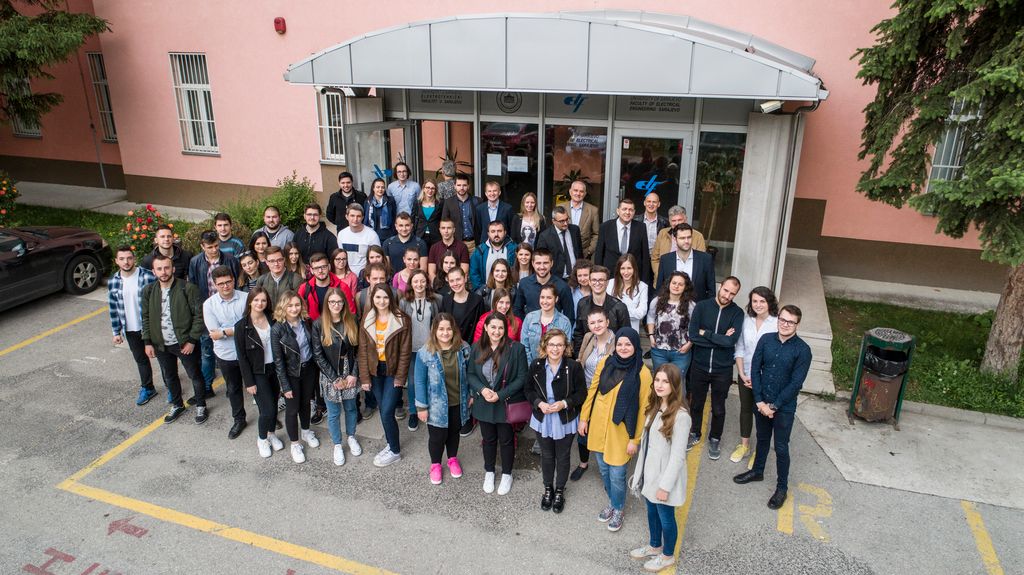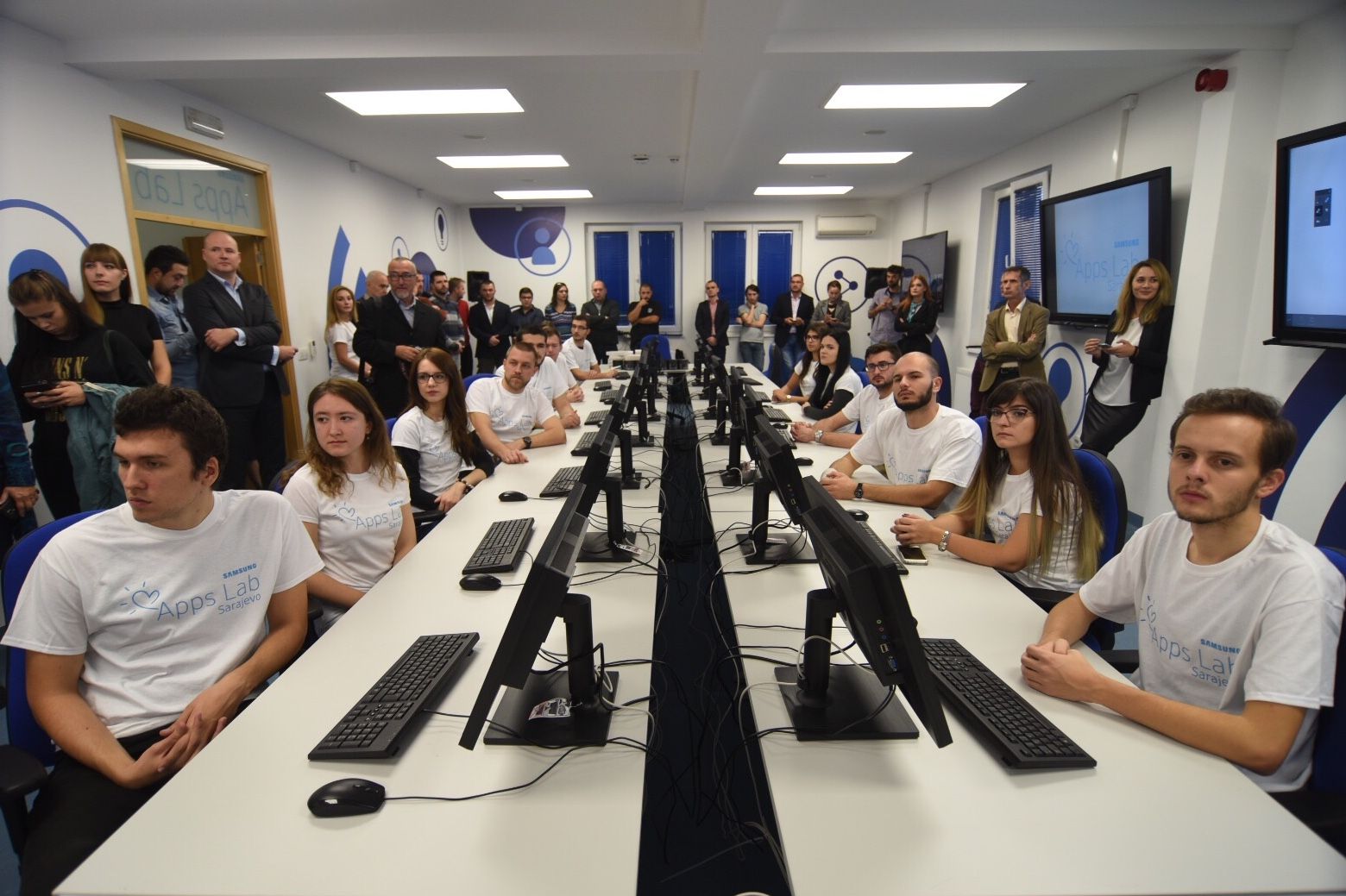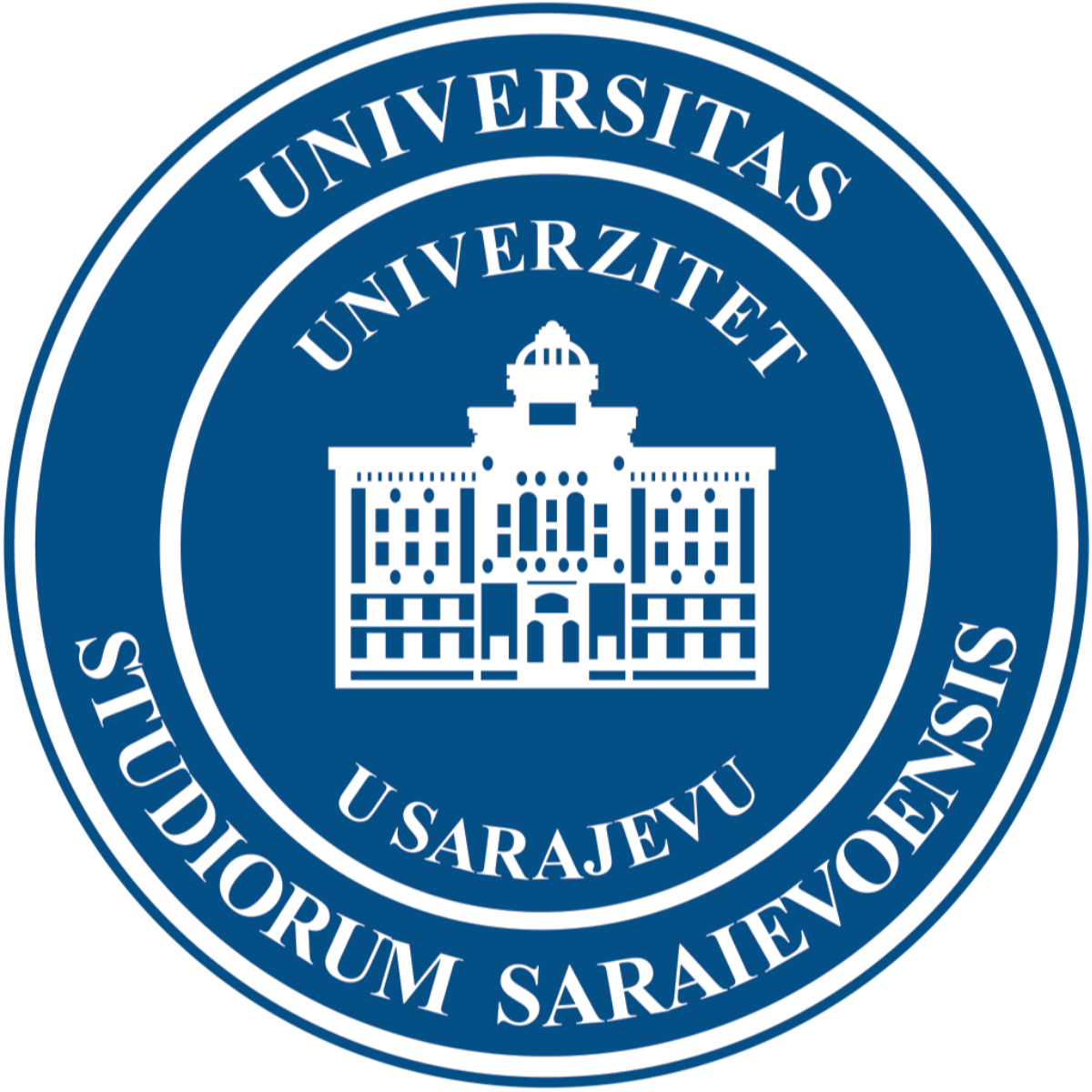Faculty of Electrical Engineering, University of Sarajevo
The Faculty of Electrical Engineering of the University of Sarajevo is the oldest and largest higher education institution in Bosnia and Herzegovina, which educates staff in various fields of electrical engineering and computer science.
The Faculty of Electrical Engineering* was founded in 1961. Since 1962, there have been two departments: the Department of Power Engineering and the Department of Automation and Electronics. The Department of Informatics was formed in 1972, and the Department of Telecommunications in 1976.
Today, the Faculty of Electrical Engineering educates leading experts in the field of power engineering, automation and electronics, computing and informatics and telecommunications through three cycles of education with a total of 12 study programs.
Today, the Faculty is located on the campus of the University of Sarajevo in facilities whose area allows a standard of approximately 5 m2 per student. For certain laboratory exercises, the Faculty also uses the capacities of public companies JP Elektroprivreda BiH and Telecom BiH.
From its foundation until today, 19,496 students have graduated from the Faculty of Electrical Engineering in Sarajevo under the Ante Bologna study program (ETF-AB), 564 candidates have obtained the degree of Master of Science and 130 candidates have obtained the degree of Doctor of Technical Sciences. According to the Bologna study program (ETF-B), the first cycle of studies (Bachelor) was completed by 2529 students, professional studies by 36 students, the second cycle of studies (Master's) by 1440 students and the third cycle of studies (PhD) by 24 students.
Today, the Faculty employs:
-49 teachers - (full time 18, associate professor 22, assistant professor 9)
- 29 assistants- (senior Assistant 15, Assistant14)
The following are engaged in additional employment:
- 6 teachers (full time 5, associate professor 1)
In the current academic year 2022/2023, 1445 students were enrolled in the first, professional and second cycle of studies.
The study takes place within four departments:
- Department of Automation and Electronics, where 291 students study in both study cycles;
- Department of Power Engineering, where 220 students study in both study cycles;
- Department of Computing and Informatics, where 681 students study in both study cycles and 119 students in the professional study of software development;
- Department of Telecommunications, where 134 students study in both study cycles;
Today, classes in each of the four Departments are realized according to two curricula:
- Old program (ETF- AB - Ante Bologna)
- New program (ETF - B - Bologna)
The new teaching (ETF-B) program enables the mobility of students during their studies and the equivalence of diplomas within the European higher education environment (ERA and EHEA).
The new curriculum enables student mobility during their studies and the equivalence of diplomas within the European Higher Education Environment (ERA and EHEA).
Students who study according to the new curriculum, after the end of the third year (first cycle) and achieved 180 ECTS credits (including the final thesis that brings 12 ECTS credits) acquire the title of Bachelor of Electrical Engineering (Electrical Engineer). After that, they can be employed or continue their studies in the second cycle, which lasts two years and which allows them to acquire the title of Master of Engineering (Bachelor of Engineering). To acquire this title, it is necessary to achieve a new 120 ECTS credits.
After completing the first (undergraduate) and second (graduate) cycles, the student can be employed or continue their studies within the third (postgraduate) cycle, which lasts three years (180 ECTS credits) and which enables the acquisition of the scientific title of Doctor of Technical Sciences.
ETF is internationally accredited by the following accreditation organizations ASIN, EQANIE, ENAEE and EUR-ACE.
In addition to activities in its basic educational activities, the Faculty of Electrical Engineering has been and remains a place of intensive scientific research and other activities related to the promotion of science and technology from its inception until today.
\
The Faculty of Electrical Engineering* was founded in 1961. Since 1962, there have been two departments: the Department of Power Engineering and the Department of Automation and Electronics. The Department of Informatics was formed in 1972, and the Department of Telecommunications in 1976.
Today, the Faculty of Electrical Engineering educates leading experts in the fiel...
Identification number:
4200494560317
Budget organization:
3502006
Deposit:
1411965320008475
Bank:
Bosna Bank International d.d. Sarajevo
Dean:
Prof.dr. Jasmin Velagić
dekan@etf.unsa.baVice Dean for General Affairs and Finance:
Prof. dr. Senad Huseinbegović
prodekan.opf@etf.unsa.baVice Dean for Academic Affairs:
Prof. dr. Adnan Mujezinović
prodekan.nastava@etf.unsa.baVice-Dean for Scientific Research:
Prof.dr. Tarik Uzunović
prodekan.nir@etf.unsa.baVice-Dean for International cooperation :
Doc. dr. Darijo Raca
prodekan.international@etf.unsa.baStudent Vice-Dean:
Asim Džindo
prodekan.student@etf.unsa.baSecretary:
Head of legal, personnel and general affairs department::
Head of Studen services:
Head of Public Procurement services:
Head of Financial service:
Legal and Human resources department:
IKT center:
ZAPRIMANJE AKATA:
Elektronska pošta za zaprimanje akata:
protokol@etf.unsa.baKonvencionalni način zaprimanja akata:
Protokol Univerzitet u Sarajevu – Elektrotehničkog fakulteta, soba 1-26, prvi sprat
Kampus Univerziteta u Sarajevu
Zmaja od Bosne bb,
71000 Sarajevo
Bosna i Hercegovina
Structure and management
The faculty consists of four departments and several services, and it is managed by the dean and faculty council, which has 64 members - employees from the ranks of teachers and associates, and students. Regular sessions of the council are held once a month.
Management
The management of the Faculty consists of the Dean and three Vice-Deans.
They are elected by the Faculty Council by secret ballot for a period of four years. A person may be elected twice to the position of dean.
The Dean is responsible for his work to the Faculty Council and the Rector of the University, in accordance with the University Statute and local rules.
Faculty Council
The Faculty Council manages the work of the Faculty together with the Dean.
The Council consists of 64 persons in teaching-scientific titles (full and associate professors, assistant professors, representatives of associates and students), and usually meets once a month.
Sessions of the Council are chaired by the Dean.
In case of need, extraordinary sessions of the Council are organized more often than once a month.
Accreditations of study programs
Since 2012, the first cycle study programs at the Faculty of Electrical Engineering in Sarajevo have received an international certificate from the accreditation agency for study programs ASIIN from Germany, which confirms that the first cycle study programs are in the fields of automation and electronics, power engineering, computing and informatics. and telecommunications in their content and manner of performance are fully consistent with the norms of higher education in force in the European Union.
The Faculty of Electrical Engineering passed the same type of accreditation in 2018, so the accreditation continued for the period until 2024.
Information on the accreditation of the First Cycle of Studies program at the Faculty of Electrical Engineering in Sarajevo can be found at the following link, where the name of the Faculty of Electrical Engineering of the University of Sarajevo stands together with all other prestigious universities in Germany, Austria and other European countries. No other higher education institution in Bosnia and Herzegovina can boast of such accreditation.
© ETF University Sarajevo




